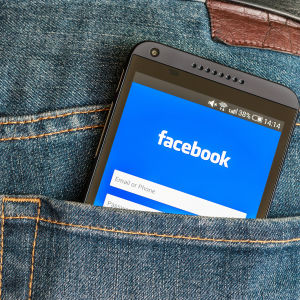The service is free, but researchers found that Facebook users wouldn’t give it up for less than $1,000 a year — a finding that may support antitrust efforts against the social media giant.
A survey of college students (age 18-22) found that the average Facebook user demanded at least $1000 to deactivate his or her Facebook account for just one year.
According to the authors of the study, this shows Facebook’s immense market power, even though the social media giant offers its services for free.
“While the measurable impact Facebook and other free online services have on the economy may be small, our results show that the benefits these services provide for their users are large,” the authors wrote.
Aram Sinnreich, chair of communication studies at American University, said the reason Facebook is so successful and influential is “not because they invented something new, it’s because they’ve insinuated themselves so successfully into something old: our psychosocial need to develop various kinds of relationships with friends, romantic partners, business partners, and fellow members of the public.”
Before Facebook, people forged different kinds of relationships via different institutions. Instead of making career connections on Facebook (or LinkedIn), people met their future employers and business partners at conferences, mixers and events. While people still use conferences and events to make career connections, social media is now the primary way many make their connections, especially college and high school students.
“That can be a good thing, when I got laid off from a corporation 10 years ago, it was Facebook that got me hooked up with a consulting job a few days later,” Sinnreich told InsideSources. “That happens every day. You might meet your next lover on Twitter or Instagram, or discover your next political cause you want to back through LinkedIn or Facebook. Historically, because these functions were separated institutionally, no single company or entity really wielded as much social power as Facebook does, because no one had the ability to serve as a middleman.”
Now people rely so much on social media companies — especially Facebook — that to do without could severely handicap one’s ability to develop and maintain various kinds of relationships.
“People who are high school and college age now have never known a world without social networks so they also lack the skills to develop those independently,” Sinnreich said. “So you can almost think of it as a parasitic relationship. If you are infected with a bacterial infection, penicillin has a lot of value to you. But it wouldn’t have the value if you didn’t have the infection to begin with. So Facebook’s value is very opportunistic in nature.”
As a result, Sinnreich said, “There’s value being diminished elsewhere in exchange for the values created by Facebook. Facebook has essentially devalued other social institutions, like journalism or social clubs and concert venues, dating services and job services — all of these different institutions that used to handle the separate stuff is being brokered by Facebook.”
Facebook decreases users’ dependency on other social institutions, so those who give up Facebook may struggle to get in touch with friends, find career opportunities, and even stay up to date on the news.
In other words, Facebook monopolizes the market of social influence.
“Facebook’s hold will not be broken without compromising a lot in terms of people’s institutional relationships,” Sinnreich said. “So how can we minimize the pain to its user base and preserve the social dimensions of the service it offers? And for all that, I think antitrust is probably the best route.”
Historically, U.S. antitrust law has relied on the Chicago School of Economics’ definition of competition, which is, good competition leads to lower prices for goods and services and thus benefits the consumer. Because Facebook offers its services at no monetary cost to the consumer, it doesn’t exactly fit the traditional criteria for a big bad company that should be broken up via antitrust litigation.
Lawrence White, professor of economics at New York University’s Leonard N. Stern School of Business, thinks Facebook’s enormous influence over its users does not deserve antitrust scrutiny.
“From a traditional antitrust perspective, this is not an antitrust problem,” he told InsideSources. “The traditional antitrust problem is, are they charging and excessively high price or otherwise deteriorating the product and providing less value than a competitive marketplace would provide? That’s hard to apply in this case.”
But that doesn’t mean Facebook’s enormous influence revealed by the study isn’t troubling — and it doesn’t mean antitrust action is impossible.
Both White and Sinnreich think Facebook’s influence could be reduced if users were given more control of their data, which is something a privacy law could manage.
“Americans need more stringent data security regulations than we currently have,” Sinnreich said. “It’s not going to be a panacea, it’s not going to instantly cure all of our problems, but it will set a new set of parameters for consumers to build more power relative to titans like Facebook.”
For starters, Sinnreich said, privacy bills like Center for Democracy and Technology’s set the right tone.
“I think they’re thinking along the right lines, I think they have a very evidence-based approach,” he said. “They have a very realistic approach, and it’s a beginning, and they understand it’s a long process.”

